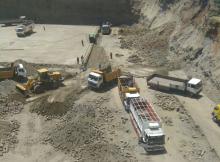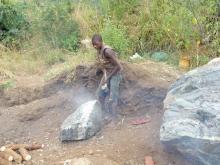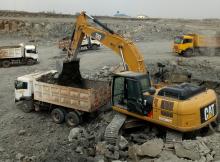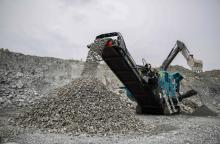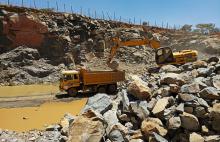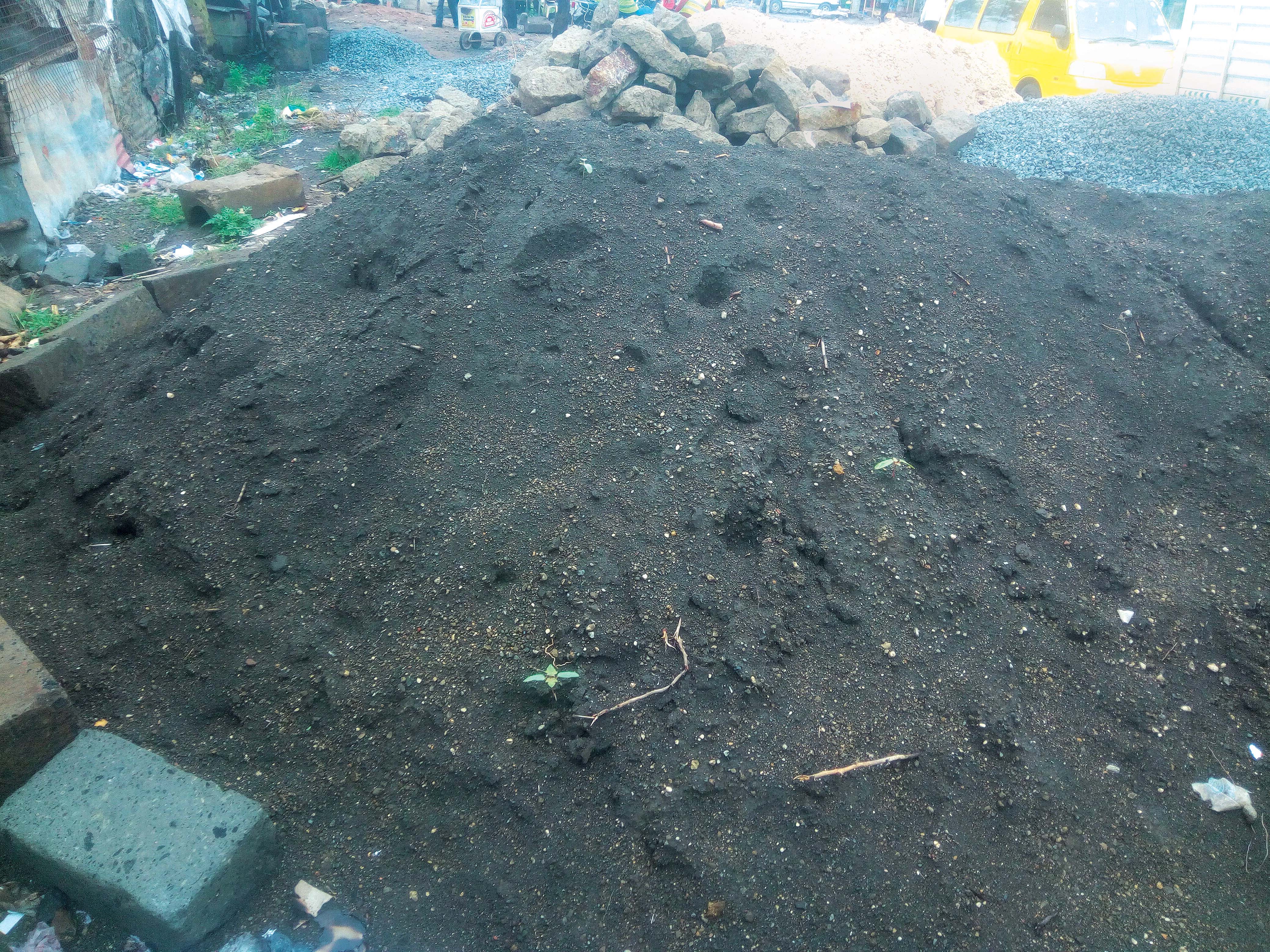
Kenya’s proposed ban on black volcanic sand has caused jitters in the domestic construction industry amid diminishing conventional river sand resources. Shadrack Kavilu reports.
In the deep ravines and gullies of Naivasha, dozens of lorries queue patiently along the valley waiting to be loaded with volcanic black sand destined for some of Kenya’s fast-growing cities and towns.
On top of the lorries, young men sit patiently with shovels at hand waiting for their turn to load, while on the ground others are collecting and piling heaps of volcanic sand washed down from Mount Longonot- a stratovolcanic mountain that deposits volcanic sand in the gullies.
This is the order of the day for hundreds of young men in Naivasha’s Mai Mahiu volcanic sand mines in Kenya’s Great Rift Valley, some 60 kilometres south-east of Nairobi.
The black volcanic sand is a product of years of volcanic eruptions and is being used as an alternative source of sand in the construction industry.
The commodity is a major source of employment and provides livelihoods for thousands of young men and women engaged in the mining and transport sector.
In the last two decades, Kenya has been facing an increasingly diminishing river sand resource as a result of over-extraction to supply the country’s fast-urbanising cities and towns.
The scarcity of river sand has seen developers turn to black volcanic sand as an alternative in construction.
In the recent past, local governments in counties that supply river sand to Nairobi and its satellite towns have imposed stringent measures to regulate the industry, a move that has created scarcity of the commodity as prices shoot up.
Driven by these dynamics, black volcanic sand has proved useful as an affordable substitute for conventional sand. The black sand’s cheap price and its availability has seen developers cut costs amid surging aggregates prices.
Due to more restrictive land use and environmental regulations, as well as the depletion of natural aggregates reserves, the use of black sand has gained significant acceptability across the country.
Over the years, engineers and sand researchers have been exploring various alternatives for conventional river sand amid diminishing sources.
In Kenya, like other east African countries, the use of substitutes for sand such as rock sand and quarry dust has been steadily gaining momentum, but not as fast as the use of volcanic black sand which is emerging as a clear alternative to conventional river sand.
While black sand is gaining traction, recent research by engineers drawn from National Building Inspectorate (NBI), which falls under the State Department of Public Works, has cast a dark cloud over the use of black sand in the construction of high-rise buildings.
The NBI is a government agency mandated to audit buildings for conformity with land registration, planning, zoning, building standards and structural soundness.
Specifically, it is the quality and standard of the black sand in construction of high-end buildings that has come under sharp scrutiny from the engineers.
“We are soon going to ban use of black sand. It doesn’t bond well with concrete and has been attributed as the cause of collapsing buildings in the country,” warned Moses Nyakiongora, secretary of the NBI.
The NBI is recommending the use of river sand in new building works, stressing that black volcanic sand should only be considered for temporary buildings and not new multi-storey buildings. The NBI has earmarked about 1,000 houses built with volcanic black sand for demolition around Nairobi.
But implementing the ban could take a little bit longer as the inspectorate is still finalising logistics on how to enforce the ban.
“At the moment enforcing the ban is complicated as it requires working with county governments. We have over 3,000 buildings going on in Nairobi on a daily basis and to supervise them is going to be really difficult,” said Nyakiongora, who added: “We can’t be at every construction site, so we need to collaborate with other law enforcers and institutions to properly implement the ban.”
The proposed volcanic black sand ban has sparked a heated debate in the construction industry and slowed the country’s quest for an alternative source of sand.
Industry pundits say that if the ban is effected it could change the country’s construction landscape as industry players are expected to experience radical changes, forcing engineers back to the drawing board to explore other alternatives to sand.
“The current building industry is geared towards concrete know-how and equipment where it relies on conventional building materials. We need to come up with alternative construction materials to ease the pressure on sand,” said Oliver Okello, acting director, Kenya Building Research Centre (KBRC).
Kenya Building Research Centre is a government agency responsible for carrying out research on building materials and dissemination of information relating to the building construction industry.
While over-exploitation of river sand has come under intense scrutiny from governments and environmentalists working in major urban centres, industry players believe alternatives to sand can be discovered to ease pressure on sand.
In the long run, Okello says the country will have to look for other alternatives for sand in order to keep pace with its fast-growing cities. “The country can’t rely on river sand alone. We need to create initiatives that will facilitate the shift for alternatives,” said the acting director.
To reduce consumption of sand, a report by
“The current situation will continue unless sand extraction is correctly priced and taxed so that other options become economically viable,” warns UNEP.
The report notes that, to achieve this objective, countries need to train architects and engineers, putting in place new laws and regulations that will create positive incentives critical to initiating a shift away from dependency on sand.
But while engineers have sounded the alarm bell over the safety of the black volcanic sand in construction, developers and sand sellers view the move with suspicion with some terming it a well-orchestrated scheme meant to deny them cheap sand which is readily available.
James Ndirangu is one such contractor who views the impending ban suspiciously. He has used black volcanic sand since it hit the market as an alternative to sand.
“We have been using this sand for decades. How come this is the time engineers have found it not viable for construction of high–rise buildings? I think they should inspect all the materials used in collapsed buildings before laying the blame on black volcanic sand.”
Other players are also warning that the move could have a devastating economic impact on thousands of families who directly and indirectly benefit from the business.
“Since the government announced its plans to ban the volcanic sand our businesses have been greatly affected. I used to sell over 60 tonnes of black sand but now I struggle to even hit 20 tonnes,” laments Duncan Karanja, a sand seller in one of the volcanic mines of Mai Mahiu.
The threat comes in the wake of a spate of collapsing buildings in Nairobi and its environs which have left a trail of destruction and death.
Industry players maintain that the ban could slow down construction in the region given that East Africa is among the region’s fast-growing economies, where the highest rate of urbanisation is taking place.
In the last decade the region has witnessed a tremendous growth in both private and public infrastructural development that has seen a boom in the construction industry.
Africa has the fastest growing cities in the world, with 40% of its one billion people living in towns and cities.
In Kenya, cities are growing by 500,000 people/year, according to predictions by the World Bank. Such growth is likely to increase the pressure on the supply of construction aggregates.
Globally, sand and gravel account for the largest volume of solid material extracted on earth.
A conservative estimate by UNEP puts the world consumption of aggregates at over 40 billion tonnes/year.
Currently there is no exact data on how much sand is used or how it is used in the country. However, anecdotal evidence shows sand is the most mined natural resource in Kenya.


